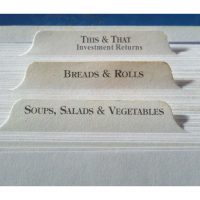Investing has always been considered a “secular endeavor,” while Biblically Responsible Investing (BRI) has been largely ignored. Before I became an investment adviser, my wife’s retirement plan advisor to us, “make money and give it to charity later.” What he didn’t understand was that, to me as a Christian (and African American male), issues of faith and diversity were important to both my wife and I. The values we wanted to include in an investment portfolio.
What is Biblically Responsible Investing?
At the beginning of her article for Christianity Today (2001), Christ’s Returns – Building an investment plan beyond profit, Mary Naber includes this quote:
“Among themselves, the merchants have a common rule, which is their chief maxim… I care nothing about my neighbor, so long as I have my profit and satisfy my greed. Of what concern is it to me if it injures my neighbor in 10 ways at once? There you see how shamelessly this maxim flies squarely in the face not only of Christian love, but also of natural law.” —Martin Luther, 1524
To that end, “biblically responsible investing” means investing according to your Christian convictions. In particular, this means striving to align your portfolios to Scriptural principles. As all Christians do not agree, hence our many denominations, your call to certain principles can be different from another Christian’s. I also challenge non-Christians to find out if their investments are aligned with their own values! Look at the returns issue that may have been thrown in your face. You won’t make as much money.
About the S & P 500
Many investment pros quote or compare themselves against the S & P 500, often quoted as the US standard for investments. Many managers pick a few of the S & P 500 in an effort to best its returns. There is a subset of the S & P 500 known as the MSCI KLD 400 Social Index (formerly Domini 400 Social Index).
This index includes companies with high Environmental, Social and Governance (ESG) ratings and excludes companies involved in Alcohol, Gambling, Tobacco, Military Weapons, Civilian Firearms, Nuclear Power, Adult Entertainment, and Genetically Modified Organisms (GMO). The Index aims to serve as a benchmark for investors, with objectives that include owning companies with high ESG ratings and avoiding companies that are incompatible with specific values-based criteria. Since 1990, its annualized return was 10.4%.
How has your portfolio or the portion invested in the 500 largest companies fared against that return?
Biblically Responsible Investing analysis
There are investment research firms, such as eVALUEator that evaluate how well investments fit Christian and other religious values. In her piece for Christianity Today, Mary Nabor uncovered that the firms we invest in may not be what they seem. She highlights how one information technology company made money for its investors through pornography. Firms like eVALUEator, do the painstaking work of taking a deeper dive than most. I was able to show one of my client companies, against abortion, that many of the organizations held in their 401k plan had actually invested in abortion. According to my research via eVALUEator, of the 23,407 companies I found in their database only 2,748 were clean. This represents 94%. eVALUEator’s statistics represent socially conservative values.
Biblically Responsible Investing options
Investments can change frequently. How can you know if you’re in an objectionable investment? Fortunately, there are investment firms ready “to maintain market out-performance by investing in companies that excel at creating value, operate with integrity, and profit from ethical and sustainable activities.”
These companies take the universe of investments and screen them against Christian values. These may include more companies than just the MSCI KLD 400 they may invest in. There are many types of investing styles, from passive to active, for an investor to choose from. Passive styles focus on asset allocation efforts (how you divide investments across categories like Large Cap US or International Small. Active strategies attempt to outperform an index. You can choose to determine your own allocation and plug these strategies into it, or pick a manager that provides a strategy to match your risk tolerance. This is similar to traditional investing practices.
Implementing Biblically Responsible Investing
Clearly outline your investing goals. “Adhering to the cultural adage, what you don’t know won’t hurt you, it is easy to hide from the truth. We are beholden to Christ’s disquieting reminder that everything in darkness shall be revealed in the light (Matt. 10:26).” – Mary Naber
If you already have a portfolio, we provide an analysis of issues you find objectionable according to your faith using eVALUEator. We will then provide an analysis of your risk tolerance to see if your asset allocation is consistent with your comfort with the loss of principal.
Yes, you can mix faith with finances. How you do so is up to you and your faith.
Past performance is no guarantee of future results. All indices are unmanaged and may not be invested directly. The opinions in this material are for general information only. These opinions are not specific advice or recommendations for any individual.










